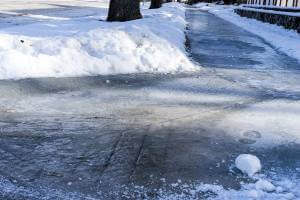 While there are many causes for slip and fall accidents, many are the result of snow or ice, particularly outside a business or public building. For example, people may encounter snow or ice in the parking lot in front of a store.
While there are many causes for slip and fall accidents, many are the result of snow or ice, particularly outside a business or public building. For example, people may encounter snow or ice in the parking lot in front of a store.
If injuries occur, the victim may be unsure if the property owner can be held liable. Do property owners in Pennsylvania have a legal obligation to clean up snow or ice to keep visitors safe? How much time do property owners have to clean things up before they could expose themselves to liability for any accidents that happen?
These are all important questions, and they can be discussed with one of the licensed lawyers at Schmidt Kramer in a free initial consultation. There is limited time to take legal action after a slip and fall injury, call us as soon as possible for help.
Pennsylvania’s Hills and Ridges Doctrine
Laws governing liability often leave some room for interpretation. It is up to the victim and his or her attorney to build a case and convince a jury the defendant is at fault.
However, Pennsylvania’s Hills and Ridges Doctrine provides a lot of clarity about liability for slip and fall accidents that result from ice or snow. The doctrine gives property owners the responsibility to act within a reasonable amount of time to remove snow or ice after it appears. Property owners are not required to immediately remove any snow or ice, as that would be a significant burden.
Victims injured in a slip and fall because of snow or ice must prove three things to hold the property owner liable for damages:
- Snow or ice accumulated in ridges in such a way that travel was obstructed, and this represented a danger to pedestrians.
- The property owner knew of the issue, or the issue had been present for long enough the property owner should have known of it.
- The dangerous accumulation of snow or ice caused the victim’s fall.
While there is a lot of clarity in this doctrine, you can be sure the property owner and his or her attorney will try to interpret things in a way that favors the property owner. For example, they may question whether the snow or ice accumulation was dangerous, as there is some room for interpretation.
Exceptions to the Hills and Ridges Doctrine
It is important to note this doctrine only applies to natural accumulation of snow or ice. If snow or ice accumulated because of a crack in the sidewalk, or because of a leaky pipe, the doctrine does not apply. That would mean the burden of proof for the victim is much lower.
While many slip and fall accidents are caused by natural accumulation of snow and ice, the property owner’s negligence may have made things worse. That is why it is best not to assume too much about your legal options after a slip and fall accident. Talk to a licensed Harrisburg slip and fall lawyer to see if you may have a case for compensation.
Local Ordinances on Snow Removal
While the Hills and Ridges Doctrine leaves some room for interpretation, there are local ordinances that may require snow to removed from an area after a specific amount of time.
For example, in the City of Harrisburg, property owners, tenants, and those who have control or supervision of vacant lots, lands, houses, buildings and all other premises by any public street or highway have just 24 hours to remove snow, ice, hail or sleet. That means the area needs to be cleaned up within 24 hours after snow stopped falling or after icy conditions formed. Property owners must clear a continuous path of at least two feet six inches in width between the primary entrance and the public sidewalk.
This is another factor your attorney may need to consider when reviewing your potential claim. That is why it is important to find an experienced lawyer with extensive knowledge of relevant laws.
Contact Us After a Slip and Fall Injury
When property owners do not take reasonable care to keep visitors safe, serious injuries can result. Property owners should be held accountable for damages if it can be proven they should have done more to protect their guests.
Our firm is dedicated to pursuing maximum compensation for personal injury victims and we have a successful track record. Your initial consultation is free and comes with no obligation to take legal action. That means there is no risk in meeting with us to discuss how we may be able to help you.
Have questions? We have answers. Call for assistance: (717) 888-8888

